18 june 2019
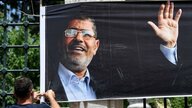
The Office of the United Nations High Commissioner for Human Rights (OHCHR) has called for an “independent and thorough” investigation into the sudden death of Egypt’s former President Mohamed Morsi, who died during a trial court session.
“Any sudden death in custody must be followed by a prompt, impartial, thorough and transparent investigation carried out by an independent body to clarify the cause of death,” said Rupert Colville, spokesman for the OHCHR, on Tuesday.
Morsi, a senior figure in the now-outlawed Muslim Brotherhood organization, was Egypt’s first democratically-elected president after the 2011 revolution, which ousted former dictator Hosni Mubarak.
However, Morsi was deposed through a bloody military coup masterminded and orchestrated by his then-defense minister and now President Abdel Fattah el-Sisi in July 2013. Sisi was the head of military intelligence at the time of 2011 revolution.
Morsi, 67, had been serving a 20-year prison term on charges of ordering the arrest and torture of protesters, a 25-year jail term on charges of passing intelligence to Qatar and a three-year term for insulting the judiciary.
In November 2016, the Court of Cassation scrapped the life imprisonment sentence for Morsi and 21 other defendants, including some who had received the death penalty, in the same case and ordered a retrial.
Egypt's public prosecutor said the former president was pronounced dead at 4:50 p.m. local time (02:50 GMT) at the hospital on Monday, and that a medical report showed no apparent recent injuries on his body.
Morsi suffered from medical neglect during his imprisonment as well as poor conditions in prison.
Last year, a report by a panel of UK legislators and attorneys warned that the lack of medical treatment could result in Morsi's "premature death.”
They panel said that Morsi was being kept in solitary confinement for 23 hours a day, which under the UN guidelines, would classify as torture.
The Egyptian Interior Ministry declared a state of alert on Monday, notably in Morsi's home province of Sharqiya in the Nile.
Amnesty international has also called for fair, transparent, and comprehensive investigation into Morsi's death.
The Middle East Eye, citing an unnamed source, reported that the former president was to share some “secrets” with the judge but requested a closed session since they would breach national security. It added that Morsi had repeatedly appealed for such a session in the past but never been granted.
‘Premeditated murder’
Separately, the Muslim Brotherhood has labeled the death as a full-fledged murder. In a strongly worded statement on Monday, the organization has called on Egyptians to gather for a mass funeral. It said Egyptian authorities were responsible for Morsi's deliberate slow death.
UK-based Mohamed Sudan, of the banned organization, insisted the death was a case of “premeditated murder”, claiming that Morsi had been prevented from receiving medicine or prison visits and information about his health was kept under wraps.
Morsi “has been placed behind a glass cage (during trials). No one could hear him or know what is happening to him,” he said, adding, “He hasn't received any visits for months or nearly a year. He complained before that he doesn't get his medicine. This is premeditated murder. This is slow death.”
The Brotherhood, which fully supported Morsi, protested against the coup, but the pro-Morsi protests were brutally crushed in the August 2013 Rabaa massacre in which more than 800 civilians were killed.
Human rights groups have regularly criticized Sisi's government for cracking down on opposition activists and supporters of Morsi’s Muslim Brotherhood movement, which has been banned in the country.
In January, Amnesty International warned that Egyptians were facing an unprecedented crackdown on freedom of expression under Sisi's administration, saying the North African state had turned into an “open-air prison” for dissidents.
“Any sudden death in custody must be followed by a prompt, impartial, thorough and transparent investigation carried out by an independent body to clarify the cause of death,” said Rupert Colville, spokesman for the OHCHR, on Tuesday.
Morsi, a senior figure in the now-outlawed Muslim Brotherhood organization, was Egypt’s first democratically-elected president after the 2011 revolution, which ousted former dictator Hosni Mubarak.
However, Morsi was deposed through a bloody military coup masterminded and orchestrated by his then-defense minister and now President Abdel Fattah el-Sisi in July 2013. Sisi was the head of military intelligence at the time of 2011 revolution.
Morsi, 67, had been serving a 20-year prison term on charges of ordering the arrest and torture of protesters, a 25-year jail term on charges of passing intelligence to Qatar and a three-year term for insulting the judiciary.
In November 2016, the Court of Cassation scrapped the life imprisonment sentence for Morsi and 21 other defendants, including some who had received the death penalty, in the same case and ordered a retrial.
Egypt's public prosecutor said the former president was pronounced dead at 4:50 p.m. local time (02:50 GMT) at the hospital on Monday, and that a medical report showed no apparent recent injuries on his body.
Morsi suffered from medical neglect during his imprisonment as well as poor conditions in prison.
Last year, a report by a panel of UK legislators and attorneys warned that the lack of medical treatment could result in Morsi's "premature death.”
They panel said that Morsi was being kept in solitary confinement for 23 hours a day, which under the UN guidelines, would classify as torture.
The Egyptian Interior Ministry declared a state of alert on Monday, notably in Morsi's home province of Sharqiya in the Nile.
Amnesty international has also called for fair, transparent, and comprehensive investigation into Morsi's death.
The Middle East Eye, citing an unnamed source, reported that the former president was to share some “secrets” with the judge but requested a closed session since they would breach national security. It added that Morsi had repeatedly appealed for such a session in the past but never been granted.
‘Premeditated murder’
Separately, the Muslim Brotherhood has labeled the death as a full-fledged murder. In a strongly worded statement on Monday, the organization has called on Egyptians to gather for a mass funeral. It said Egyptian authorities were responsible for Morsi's deliberate slow death.
UK-based Mohamed Sudan, of the banned organization, insisted the death was a case of “premeditated murder”, claiming that Morsi had been prevented from receiving medicine or prison visits and information about his health was kept under wraps.
Morsi “has been placed behind a glass cage (during trials). No one could hear him or know what is happening to him,” he said, adding, “He hasn't received any visits for months or nearly a year. He complained before that he doesn't get his medicine. This is premeditated murder. This is slow death.”
The Brotherhood, which fully supported Morsi, protested against the coup, but the pro-Morsi protests were brutally crushed in the August 2013 Rabaa massacre in which more than 800 civilians were killed.
Human rights groups have regularly criticized Sisi's government for cracking down on opposition activists and supporters of Morsi’s Muslim Brotherhood movement, which has been banned in the country.
In January, Amnesty International warned that Egyptians were facing an unprecedented crackdown on freedom of expression under Sisi's administration, saying the North African state had turned into an “open-air prison” for dissidents.

The Hamas Movement has mourned former Egyptian president Mohamed Morsi, who passed away on Monday, and hailed his role in serving the Palestinian cause.
Morsi died Monday during a court appearance to face politically motivated charges against him.
In a statement, Hamas said Morsi passed away after a long struggle in the service of Egypt, its people and the issues of the Muslim nation, especially the Palestinian cause.
The Movement applauded his great role in defending Jerusalem and the Aqsa Mosque since he was a member of the Egyptian parliament.
It offered its condolences to Egypt, its people, his family, friends and all those who loved him, praying to Allah Almighty to bestow His mercy upon him and make paradise his eternal dwelling place.
Morsi died Monday during a court appearance to face politically motivated charges against him.
In a statement, Hamas said Morsi passed away after a long struggle in the service of Egypt, its people and the issues of the Muslim nation, especially the Palestinian cause.
The Movement applauded his great role in defending Jerusalem and the Aqsa Mosque since he was a member of the Egyptian parliament.
It offered its condolences to Egypt, its people, his family, friends and all those who loved him, praying to Allah Almighty to bestow His mercy upon him and make paradise his eternal dwelling place.
17 june 2019
|
|
Egypt's former President Mohamed Morsi has passed away during a trial court session in the capital Cairo, state television says.
It said 67-year-old Morsi fainted during a court session on Monday and died afterwards. "He was speaking before the judge for 20 minutes then became very animated and fainted. He was quickly rushed to the hospital where he later died," a judicial source said. Morsi, a senior figure in the Muslim Brotherhood organization, was Egypt’s first democratically-elected president after the 2011 revolution, but he was deposed following a military coup led by Abdel Fattah el-Sisi in July 2013. |
He had been serving a 20-year prison term on charges of ordering the arrest and torture of protesters, a 25-year jail term on charges of passing intelligence to Qatar and a three-year term for insulting the judiciary.
In November 2016, the Court of Cassation scrapped the life imprisonment sentence for Morsi and 21 other defendants, including some who had received the death penalty, in the same case and ordered a retrial.
Turkish President Recep Tayyip Erdogan became the first world leader to pay tribute to Morsi, calling him a martyr.
"May Allah rest our brother Morsi, our martyr's soul in peace," said Erdogan, who had forged close ties with the late former president.
The Muslim Brotherhood has labeled the death as a full-fledged murder. In a strongly worded statement, the organization has called on Egyptians to gather for a mass funeral. It said Egyptian authorities were responsible for Morsi's deliberate slow death.
In addition, Human Rights Watch described the news of his death as "terrible" but "entirely predictable", citing the Egyptian government's "failure to allow him adequate medical care.”
Egypt's public prosecutor said the former president was pronounced dead at 4:50 p.m. local time (02:50 GMT) at the hospital, and that a medical report showed no apparent recent injuries on his body.
Morsi suffered from medical neglect during his imprisonment as well as poor conditions in jail.
Last year, a report by a panel of UK legislators and attorneys warned that the lack of medical treatment could result in Morsi's "premature death.”
"Our conclusions are stark," Crispin Blunt, the Detention Review Panel's chairman, said at the time. "The denial of basic medical treatment to which he is entitled could lead to his premature death."
They panel said that Morsi was being kept in solitary confinement for 23 hours a day, which under the UN guidelines, would classify as torture.
The Egyptian Interior Ministry declared a state of alert on Monday, notably in Mursi's home province of Sharqiya in the Nile
Amnesty international has also called for fair, transparent, and comprehensive investigation into Morsi's death.
“Egyptian authorities had the responsibility to ensure that, as a detainee, he had access to proper medical care," Amnesty said.
It added, “Mohamed Morsi was subjected to enforced disappearance for months after his detention, before first appearing in front of a judge on November 4, 2013. He was held in solitary confinement for almost six years, placing a considerable strain on his mental and physical well-being and violating the absolute prohibition against torture and other ill-treatment under international law.
During this six-year period, he was effectively cut off from the outside world – he was allowed only three family visits and was prevented from access to his lawyers or a doctor."
In November 2016, the Court of Cassation scrapped the life imprisonment sentence for Morsi and 21 other defendants, including some who had received the death penalty, in the same case and ordered a retrial.
Turkish President Recep Tayyip Erdogan became the first world leader to pay tribute to Morsi, calling him a martyr.
"May Allah rest our brother Morsi, our martyr's soul in peace," said Erdogan, who had forged close ties with the late former president.
The Muslim Brotherhood has labeled the death as a full-fledged murder. In a strongly worded statement, the organization has called on Egyptians to gather for a mass funeral. It said Egyptian authorities were responsible for Morsi's deliberate slow death.
In addition, Human Rights Watch described the news of his death as "terrible" but "entirely predictable", citing the Egyptian government's "failure to allow him adequate medical care.”
Egypt's public prosecutor said the former president was pronounced dead at 4:50 p.m. local time (02:50 GMT) at the hospital, and that a medical report showed no apparent recent injuries on his body.
Morsi suffered from medical neglect during his imprisonment as well as poor conditions in jail.
Last year, a report by a panel of UK legislators and attorneys warned that the lack of medical treatment could result in Morsi's "premature death.”
"Our conclusions are stark," Crispin Blunt, the Detention Review Panel's chairman, said at the time. "The denial of basic medical treatment to which he is entitled could lead to his premature death."
They panel said that Morsi was being kept in solitary confinement for 23 hours a day, which under the UN guidelines, would classify as torture.
The Egyptian Interior Ministry declared a state of alert on Monday, notably in Mursi's home province of Sharqiya in the Nile
Amnesty international has also called for fair, transparent, and comprehensive investigation into Morsi's death.
“Egyptian authorities had the responsibility to ensure that, as a detainee, he had access to proper medical care," Amnesty said.
It added, “Mohamed Morsi was subjected to enforced disappearance for months after his detention, before first appearing in front of a judge on November 4, 2013. He was held in solitary confinement for almost six years, placing a considerable strain on his mental and physical well-being and violating the absolute prohibition against torture and other ill-treatment under international law.
During this six-year period, he was effectively cut off from the outside world – he was allowed only three family visits and was prevented from access to his lawyers or a doctor."
13 may 2019
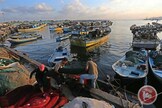
Egyptian naval forces detained four Palestinian fishermen off the coast of Rafah, south of the besieged Gaza Strip bordering Egypt, on Sunday.
Head of the Palestinian Fishermen Union in Gaza, Zakariya Bakr, told Ma'an that Egyptian naval forces detained four fishermen from two fishing boats off the coast of Rafah.
Bakr added the Egyptian forces confiscated the two fishing boats and sailed them to an unknown location.
Bakr identified the four fishermen as Muhammad Ziyad Sayad, 22, Ahmad Omar al-Bardawil, 30, Ibrahim Muhammad al-Bardawil, 22, and Ibrahim Khalil al-Bardawil, 42.
Egypt upholds an Israeli military blockade on Gaza, keeping borders largely closed and limiting imports, exports, and the freedom of movement of its residents.
The threat from Egyptian forces comes as Palestinian fishermen already face daily risks in order to make a living, including routine harassment from Israeli naval forces, confiscation of boats and materials, detention and potentially death.
Israeli forces open fire towards Palestinian fishing boats on a daily basis.
Head of the Palestinian Fishermen Union in Gaza, Zakariya Bakr, told Ma'an that Egyptian naval forces detained four fishermen from two fishing boats off the coast of Rafah.
Bakr added the Egyptian forces confiscated the two fishing boats and sailed them to an unknown location.
Bakr identified the four fishermen as Muhammad Ziyad Sayad, 22, Ahmad Omar al-Bardawil, 30, Ibrahim Muhammad al-Bardawil, 22, and Ibrahim Khalil al-Bardawil, 42.
Egypt upholds an Israeli military blockade on Gaza, keeping borders largely closed and limiting imports, exports, and the freedom of movement of its residents.
The threat from Egyptian forces comes as Palestinian fishermen already face daily risks in order to make a living, including routine harassment from Israeli naval forces, confiscation of boats and materials, detention and potentially death.
Israeli forces open fire towards Palestinian fishing boats on a daily basis.
3 may 2019
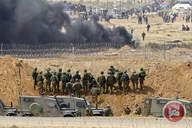
Egyptian mediators urgently summoned senior Hamas movement officials, including Yahya Sinwar, the head of its politburo in Gaza, and senior members of the Palestinian Islamic Jihad movement, to the Egyptian capital of Cairo, on Friday.
According to Hebrew-language news outlets, Egyptian mediators summoned senior Hamas and Islamic Jihad officials to Cairo, in an attempt to prevent an escalation along the Gaza border with Israel.
Sources added that the summon came after Israeli warplanes carried out airstrikes, targeting a number of Hamas sites in northern Gaza, "in response" to the launching of incendiary balloons and explosive objetcs by Palestinians from the besieged Gaza Strip into southern Israel.
Palestinians in Gaza view the incendiary kites as a form of protest against Israel's nearly 12-year blockade of Gaza and for Palestinian refugees right of return to their homes and lands which are now known as Israel.
According to Hebrew-language news outlets, Egyptian mediators summoned senior Hamas and Islamic Jihad officials to Cairo, in an attempt to prevent an escalation along the Gaza border with Israel.
Sources added that the summon came after Israeli warplanes carried out airstrikes, targeting a number of Hamas sites in northern Gaza, "in response" to the launching of incendiary balloons and explosive objetcs by Palestinians from the besieged Gaza Strip into southern Israel.
Palestinians in Gaza view the incendiary kites as a form of protest against Israel's nearly 12-year blockade of Gaza and for Palestinian refugees right of return to their homes and lands which are now known as Israel.
8 apr 2019
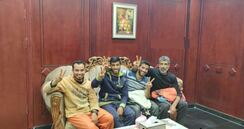
The Egyptian authorities on Sunday evening released four Palestinian fishermen after they were arrested recently in Rafah waters between the Gaza Strip and Egypt.
The released fishermen arrived in Gaza through the Rafah border crossing, where officials from the Palestinian interior ministry received and welcomed them.
Egyptian naval forces had arrested the fishermen about a week ago and wounded one of them during their presence off the southern coast of Gaza.
The released fishermen arrived in Gaza through the Rafah border crossing, where officials from the Palestinian interior ministry received and welcomed them.
Egyptian naval forces had arrested the fishermen about a week ago and wounded one of them during their presence off the southern coast of Gaza.
2 apr 2019
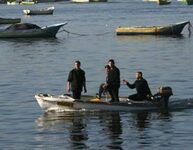
Israeli navy ships attacked, on Tuesday at noon, several Palestinian fishing boats in the Central District of the besieged and impoverished Gaza Strip.
The head of the Palestinian Fishermen Union in Gaza, Zakariya Bakr, said the navy chased several fishing boats less than twelve nautical miles from the shore.
Bakr added that the navy sprayed the boats with waste-water mixed with chemicals.
In related news, Egyptian navy ships surrounded a Palestinian fishing boat nearly 250 meters away from Egyptian waters, before detaining three fishermen, identified as Mos’ab Qannan, 23, Khaled Qannan, 26, and Ra’fat Qanna, 43, from Khan Younis, in the southern part of the Gaza Strip, and confiscated their boat.
The Egyptian navy also detained another fisherman, identified as Soheib Abu Salmiya, after opening fire at his boat, near Rafah, in southern Gaza.
The head of the Palestinian Fishermen Union in Gaza, Zakariya Bakr, said the navy chased several fishing boats less than twelve nautical miles from the shore.
Bakr added that the navy sprayed the boats with waste-water mixed with chemicals.
In related news, Egyptian navy ships surrounded a Palestinian fishing boat nearly 250 meters away from Egyptian waters, before detaining three fishermen, identified as Mos’ab Qannan, 23, Khaled Qannan, 26, and Ra’fat Qanna, 43, from Khan Younis, in the southern part of the Gaza Strip, and confiscated their boat.
The Egyptian navy also detained another fisherman, identified as Soheib Abu Salmiya, after opening fire at his boat, near Rafah, in southern Gaza.
1 mar 2019
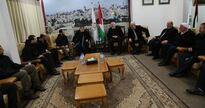
Four Palestinian young men abducted by unidentified gunmen in Egypt’s Sinai Peninsula in 2015 have been released by the Egyptian security authorities on Thursday evening.
“The four men have been released and have safely returned to Gaza,” Ismail Haneyya, head of Hamas’s political bureau, said in a statement, expressing his “deep gratitude to the Egyptian leadership” for the step.
Haneyya also announced the release of four other citizens from Gaza and their return to their families.
In a statement released earlier Thursday, Haneyya said that the issue of the Palestinian detainees was addressed during his recent talks with Egyptian officials in Cairo.
In August of 2015, unidentified gunmen abducted the four Palestinians as they took a bus through Sinai from the Rafah border crossing to Cairo.
Last Wednesday, Haneyya and an accompanying delegation returned to Gaza following a three-week visit to Cairo for talks with Egyptian officials.
Upon Haneyya’s return to Gaza, Hamas spokesman Abdul-Latif al-Qanoua stated: “Hamas is satisfied with the results of the visit; Egypt understands our position on a range of issues.”
“The four men have been released and have safely returned to Gaza,” Ismail Haneyya, head of Hamas’s political bureau, said in a statement, expressing his “deep gratitude to the Egyptian leadership” for the step.
Haneyya also announced the release of four other citizens from Gaza and their return to their families.
In a statement released earlier Thursday, Haneyya said that the issue of the Palestinian detainees was addressed during his recent talks with Egyptian officials in Cairo.
In August of 2015, unidentified gunmen abducted the four Palestinians as they took a bus through Sinai from the Rafah border crossing to Cairo.
Last Wednesday, Haneyya and an accompanying delegation returned to Gaza following a three-week visit to Cairo for talks with Egyptian officials.
Upon Haneyya’s return to Gaza, Hamas spokesman Abdul-Latif al-Qanoua stated: “Hamas is satisfied with the results of the visit; Egypt understands our position on a range of issues.”
17 feb 2019
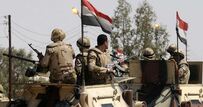
The Hamas Movement has strongly denounced the deadly attack on Egyptian soldiers in northern Sinai on Saturday, describing it as a criminal and terrorist act targeting Egypt’s security and stability.
In a press release, Hamas said that such heinous acts would help the enemies of Egypt and the Muslim nation to carry out their schemes and drag the region into a spiral of more violence.
Fifteen Egyptian military personnel were killed or wounded in a terror attack on Saturday morning in North Sinai. Seven militants were also killed during armed clashes with Egyptian soldiers.
In a press release, Hamas said that such heinous acts would help the enemies of Egypt and the Muslim nation to carry out their schemes and drag the region into a spiral of more violence.
Fifteen Egyptian military personnel were killed or wounded in a terror attack on Saturday morning in North Sinai. Seven militants were also killed during armed clashes with Egyptian soldiers.
16 feb 2019
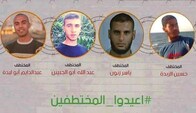
Member of Hamas’s political bureau Mohamed Nazzal has affirmed that Egypt pledged to release Palestinian prisoners from its jails, adding that there is important progress in this regard.
“Hamas is following up the issue of the detainees in Egyptian prisons, especially with regard to its four prisoners,” Nazzal said in recent remarks to Shehab News Agency.
On August 19, 2015, unknown gunmen kidnapped four Palestinian young men from al-Qassam Brigades of Hamas after intercepting a passenger bus in northern Sinai as it was en route to Cairo airport.
Nazzal pointed out that there was a decrease in the number of Palestinian detainees in Egyptian jails, asserting that Hamas was following up the files of all Palestinian prisoners who were exposed to illegal detention in Egypt.
The Hamas official also accused the Palestinian Authority (PA) leadership of conspiring against Gaza and trying to push its population to explode instead of assuming its responsibilities.
However, he said that the Palestinian parties in Gaza and the UN would continue to make efforts to have the siege on Gaza lifted, adding that the Egyptians promised not to close the Rafah border crossing.
“Hamas is following up the issue of the detainees in Egyptian prisons, especially with regard to its four prisoners,” Nazzal said in recent remarks to Shehab News Agency.
On August 19, 2015, unknown gunmen kidnapped four Palestinian young men from al-Qassam Brigades of Hamas after intercepting a passenger bus in northern Sinai as it was en route to Cairo airport.
Nazzal pointed out that there was a decrease in the number of Palestinian detainees in Egyptian jails, asserting that Hamas was following up the files of all Palestinian prisoners who were exposed to illegal detention in Egypt.
The Hamas official also accused the Palestinian Authority (PA) leadership of conspiring against Gaza and trying to push its population to explode instead of assuming its responsibilities.
However, he said that the Palestinian parties in Gaza and the UN would continue to make efforts to have the siege on Gaza lifted, adding that the Egyptians promised not to close the Rafah border crossing.
23 jan 2019
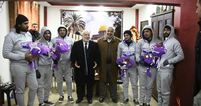
Palestinian naval forces in the blockaded Gaza Strip pulled the body of an Egyptian fisherman from Gaza’s western shoreline.
Reporting from the besieged enclave, a PIC news correspondent said the seventh Egyptian fisherman who disappeared following the storm that hit the area on January 17 was found dead and transferred to a hospital.
The Naval Police in the blockaded Gaza Strip rescued at daybreak Thursday six Egyptian fishermen off Gaza’s seashore, after violent winds tossed their fishing vessel into Gaza’s water.
The six rescued Egyptians were taken to Shuhadaa al-Aqsa Hospital for treatment.
Media sources said Gaza’s naval forces rushed to the scene to pull the Egyptian fishermen after their boat capsized and crashed in Gaza’s coast.
Reporting from the besieged enclave, a PIC news correspondent said the seventh Egyptian fisherman who disappeared following the storm that hit the area on January 17 was found dead and transferred to a hospital.
The Naval Police in the blockaded Gaza Strip rescued at daybreak Thursday six Egyptian fishermen off Gaza’s seashore, after violent winds tossed their fishing vessel into Gaza’s water.
The six rescued Egyptians were taken to Shuhadaa al-Aqsa Hospital for treatment.
Media sources said Gaza’s naval forces rushed to the scene to pull the Egyptian fishermen after their boat capsized and crashed in Gaza’s coast.
17 jan 2019
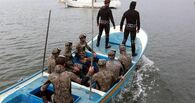
The Naval Police in the blockaded Gaza Strip rescued at daybreak Thursday six Egyptian fishermen off Gaza’s seashore, after violent winds tossed their fishing vessel into Gaza’s water.
Another fishermen has, however, gone missing. The six rescued Egyptians were taken to Shuhadaa al-Aqsa Hospital for treatment.
Media sources said Gaza’s naval forces rushed to the scene to pull the Egyptian fishermen after their boat capsized and crashed in Gaza’s coast.
Another fishermen has, however, gone missing. The six rescued Egyptians were taken to Shuhadaa al-Aqsa Hospital for treatment.
Media sources said Gaza’s naval forces rushed to the scene to pull the Egyptian fishermen after their boat capsized and crashed in Gaza’s coast.
Page: 2 - 1
